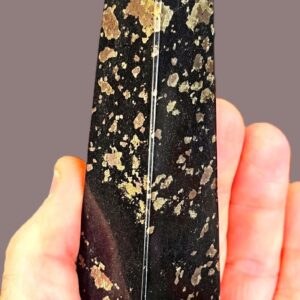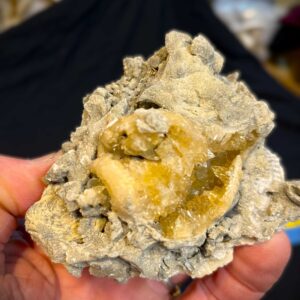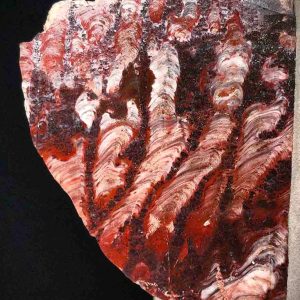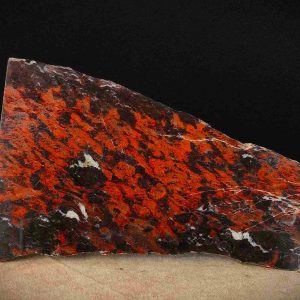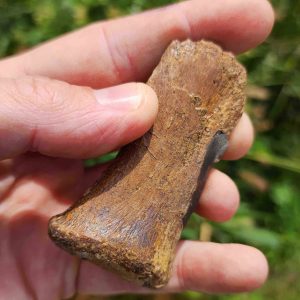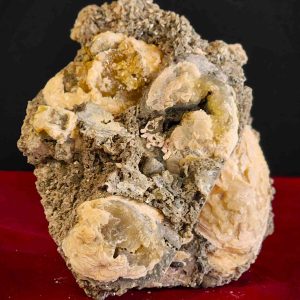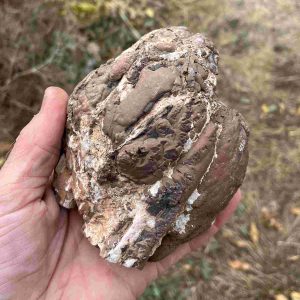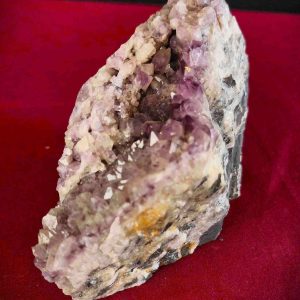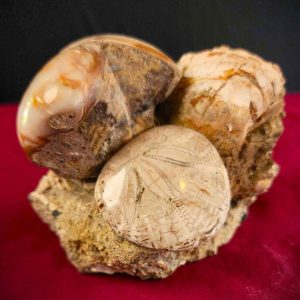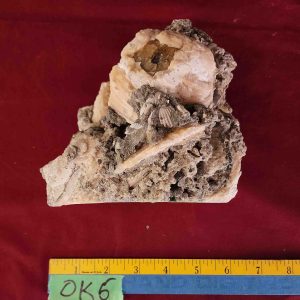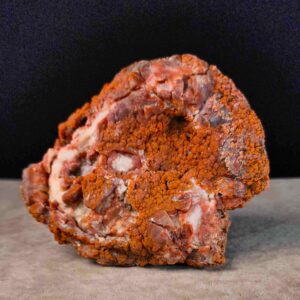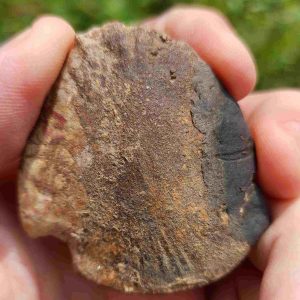-
Sudbury Impactite (2)
Notes specific to this specimen:
You’ve never seen this before! Why? Because we are the only source for it. These striking Sudbury specimens are cut to reveal the lustrous nickel and copper ore crystals scattered across its dark magmatic matrix. The flashy metallic patches catch the light beautifully, highlighting this classic mega-impact site whose resulting nickel–copper ore made Sudbury world-famous. A rare and powerful authentic piece of Canadian geology from 1.8 billion years ago.We are offering only a very limited number of specimens of this material. Most will be in the form of obelisks because they show off the mineralization patterns very clearly. At present we are offering only two different size obelisks. This is the larger one. The photos here are typical of this size. But you may not get this exact piece! Please keep in mind there is variation from piece to piece and the one you get may differ slightly from what is seen here. However, these photos are a good representation of what you can expect. Of course, as always, we guarantee your satisfaction or your money back.
SIZE: 4″ – 6″ tall
NAME: Sudbury Impactite
MINERALS: Pentlandite (nickel) & Chalcopyrite (copper)
AGE: Paleoproterozoic Era – 1.85 billion years
UNIT: Sudbury Impact Complex
SITE: Sudbury, Ontario, CanadaDocumentation: This specimen comes with a Certificate of Authenticity and Origin. In addition, an informative display card accompanies the specimen.
$345.00Sudbury Impactite (2)
$345.00 -
Crystalized Welks (W3)
Notes specific to this specimen: Fossil welks are much rarer than the clams found at Rucks Pit and most of them have no crystals. But, when you do find a nice crystal-line specimen, there’s nothing like it in the world! Here we have a nice matrix specimen with a natural opening on the side of the shell exposing gemmy dog-tooth calcite crystals. They don’t get much better than this!
SIZE: 4″
NAME: Mercenaria permagna
AGE: Pleistocene 2 million years
UNIT: Nashua Formation
SITE: Okeechobee County, FloridaDocumentation: This authentic fossil specimen comes with a Certificate of Authenticity and Origin. In addition, an attractive and informative display card accompanies the specimen.
$360.00Crystalized Welks (W3)
$360.00 -
Iron Stromatolites (ME3)
Notes specific to this specimen: Rare white colonies with dark banded growth rings. Some have branchings. Specimen found in 1990s at the old Mary Ellen Mine in Biwabik, Minnesota, the type locality for the Biwabik Iron Formation. Notice the silvery spots of concentrated iron between the colonies.
SIZE: 3″ x 5″ x .3″
Name: Collenia undosa
Unit: Biwabik Iron Formation
Site: Biwabik Iron Range, Minnesota
Date: Mid 1990sDocumentation: This authentic fossil specimen comes with a Certificate of Authenticity and Origin.
$365.00Iron Stromatolites (ME3)
$365.00 -
Iron Stromatolites (ME5)
Notes specific to this specimen: Beautiful deep red agatization in these colonies attest to the classic origin of this specimen as being from the old Mary Ellen Mine in Biwabik, Minnesota, the type locality for the Biwabik Iron Formation. Notice the off-set angle of the growth pattern in this piece. This is attributed to constant water currents in the area where these colonies were growing.
SIZE: 4″ x 8″ x .3″
Name: Collenia undosa
Unit: Biwabik Iron Formation
Site: Biwabik Iron Range, Minnesota
Date: Mid 1990sDocumentation: This authentic fossil specimen comes with a Certificate of Authenticity and Origin.
$365.00Iron Stromatolites (ME5)
$365.00 -
Dinosaur Bones (D4)
Notes specific to this specimen: This is a distal manus digit (“finger”) bone of Edmontosaurus. In vertebrates, the ends of the front appendages are called the “manus” (aka hand) while the back are called the “pes” (aka foot). The fine detail on the bone surface is remarkably well preserved. This piece has a small amount of reconstruction as shown in the dark paleoclay area.
SIZE: 3″ x 1″ x 1″
NAME: Edmontosaurus
AGE: Cretaceous Period – 68 million years
UNIT: Lance Creek Formation
SITE: Lance Creek, WyomingDATE: 1992
Documentation: This authentic fossil specimen comes with a Certificate of Authenticity and Origin.
$365.00Dinosaur Bones (D4)
$365.00 -
Crystalized Clam (OK9)
Notes specific to this specimen: Lots going on here: Three shells with shiny nice dogtooth calcite crystals trapped in matrix. Plus a superb large shell with great recrystallization.
SIZE: 9″x 8″x 5″
NAME: Mercenaria permagna
AGE: Pleistocene 2 million years
UNIT: Nashua Formation
SITE: Okeechobee County, FloridaDocumentation: This authentic fossil specimen comes with a Certificate of Authenticity and Origin. In addition, an attractive and informative display card accompanies the specimen.
$385.00Crystalized Clam (OK9)
$385.00 -
Volcanic Bomb (EB2)
Notes specific to this specimen: Rare, beautifully-shaped double bomb. These unique specimens form when two magma projectiles run into each other in flight before they completely harden. Each had started to acquire it’s own individual character before they combined and fell to Earth.
SIZE: 4″ x 6″ x 3″
NAME: Various forms
AGE: Pliocene Epoch- 5 million years
UNIT: Banbury Formation
SITE: Elko County, Nevada
DATE: 2020Documentation: This authentic fossil specimen comes with a Certificate of Authenticity and Origin.
$385.00Volcanic Bomb (EB2)
$385.00 -
Cerdito Prospect Rift Crystals (CP14)
Notes specific to this specimen: Cool combination of nice light smokey quartz crystals and deep amethyst crystals in the same vein. Nice healed fracturing evident on the edge. This piece has a cut-flat bottom so it stands up and displays very nicely. Take a look at the cut bottom and you’ll see the very graphic splitting of the matrix and the subsequent infilling with white quartz and citrine.
SIZE: 6″ x 3″ x 4″
Quartz – Amethyst, Smokey, Citrine, Clear
AGE: Mesoproterozoic Era – 1.1 billion years
UNIT: Rove Formation
SITE: Thunder Bay, Ontario, Canada
DATE: 2022Documentation: This authentic mineral specimen comes with a Certificate of Authenticity and Origin.
$385.00 -
Fossil Sand Dollar and Clam (KH9)
Notes specific to this specimen: One large polished sand dollar with two great polished clams. Matrix piece that has a flat bottom so it stands nicely.
SIZE: 4″x 2″x 3″
NAME: Psuedocardium & Dendraster
AGE: Pliocene 4 million years
UNIT: Etchegoin Formation
SITE: Kettleman Hills, CaliforniaDocuments: This authentic fossil specimen comes with a Certificate of Authenticity and Origin. In addition, an attractive and informative display card accompanies the specimen.
$395.00 -
Crystalized Clam (OK6)
Crystalized fossil clams like this are exceptionally rare. These clams lived in a shallow sea that covered most of Florida 2 million years ago. A sudden storm event buried the clams, trapping cavities inside. When the shells began to dissolve, it provided the material necessary to grow calcite crystals in the open spaces. These unusual fossils are known from only one site, an old quarry near Lake Okeechobee. The quarry played out and flooded in 2007. We excavated this in 2023. An attractive and informative display card accompanies the specimen.
Notes specific to this specimen: Great honey calcite crystals replacing multiple clam shells trapped in matrix. This piece has a sawn flat bottom so it stands up nicely on its own
SIZE: 7″x 4″x 5″
NAME: Mercenaria permagna
AGE: Pleistocene 2 million years
UNIT: Nashua Formation
SITE: Okeechobee County, FloridaDocumentation: This authentic fossil specimen comes with a Certificate of Authenticity and Origin. In addition, an attractive and informative display card accompanies the specimen.
$410.00Crystalized Clam (OK6)
$410.00 -
Agatized Algae (AA2)
Notes specific to this specimen: A rare, complete nodule. This specimen is a round, deflated sphere with nice bubbly agate skin all over it. One side is concave, the other convex, indicating the orientation of the original colony in the sediments. Can you guess which way it was oriented? Answer – the convex side was up. As the sediments accumulated and the agal ball deteriorated, the top collapsed. The bottom, meanwhile, was supported by the sediments below allowing it to retain its original shape.
SIZE: 5″x 4″x 2″
NAME: Various species
AGE: Jurassic Period- 165 million years
UNIT: Curtis Formation
SITE: Emery County, Utah
DATE: 2010Documentation: This authentic fossil specimen comes with a Certificate of Authenticity and Origin.
$420.00Agatized Algae (AA2)
$420.00 -
Dinosaur Bones (D3)
Notes specific to this specimen: Commonly called the “hoof” of a hadrosaur – in this case Edmontosaurus – this is the end bone of a pes digit (toe). In vertebrates, the ends of the front appendages are called the “manus” (aka hand) while the back are called the “pes” (aka foot). The fine detail on the bone surface is remarkably well preserved. This piece has a small amount of reconstruction as shown in the dark paleoclay area.
SIZE: 3″ x 2″ x 3″
NAME: Edmontosaurus
AGE: Cretaceous Period – 68 million years
UNIT: Lance Creek Formation
SITE: Lance Creek, WyomingDATE: 1992
Documentation: This authentic fossil specimen comes with a Certificate of Authenticity and Origin.
$420.00Dinosaur Bones (D3)
$420.00
Shop Our Catalog
- Browse All Products
- Agatized Algae
- Agatized Coral
- Cerdito Prospect Rift Crystals
- Rucks Pit
- Dinosaur Bones
- Exceptional Museum Specimens
- Fossil Echinoids
- Fossil Fern
- Gunflint Iron Rainbow Stromatolite
- Gypsum Selenite
- Iron Range Stromatolites
- Kettleman Hills Fossils
- Kona Dolomite
- Specularite
- Sudbury Impactite
- Volcanic Bombs

